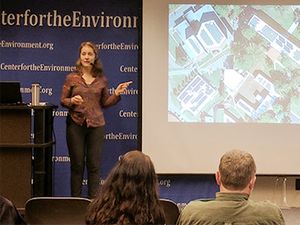
(Photo: Hannah Davis)
By Hannah Davis '17
Growing up in the busy city of Los Angeles, Julian Keniry remembers that fateful day in elementary school when she and her classmates were sent home because of poor air quality. She recalls it as one of the turning points in her life when it came to her ambition to work toward a sustainable future.
The second turning point happened when she was studying abroad in Germany at the age of 18, and she saw how sustainably advanced the Germans were compared to the United States. She remembers thinking to herself, "If Germany can get a whole country interested in composting and wind power, then why can't the U.S? ....We are the United States. We should be leading this [environmental initiative]."
Now, Keniry acts as a senior director of the National Wildlife Federation (NWF), particularly immersing herself in higher education, such as campus sustainability initiatives and a program called EcoLeaders.
It is with this career that Keniry found her way to the Catawba College campus on March 1, initially to attend and speak at the Mid-Year Appalachian Energy Summit, which featured a whole day of activities on sustainable energy alternatives for over 130 people from North Carolina universities and energy organizations. Her second talk, attended by Catawba students and the community, centered on "The Wild Side of Education." Both events were held at the Catawba College Center for the Environment.
Keniry focused her evening talk on the importance of higher education institutions focusing on teaching sustainability and creating sustainable initiatives for students to get involved in. When Keniry first heard that she would be coming to Catawba College, she looked it up on Google Maps and was blown away by how many solar panels she saw on the campus.
"We [the NWF] have worked with colleges and universities all over the world, and never seen this before," Keniry remarked, "so, bravo, Catawba College!"
However, even though there are things that are going right in terms of environmental education in colleges, Keniry still believes that there is room to keep pushing forward with that change through education. One of those points was "to make biodiversity central to education and to give the things that you teach a bioregional context." For example, if you live near the Chesapeake Bay, Keniry believes that you should focus your teaching on the environmental issues happening in the Chesapeake Bay to truly bring these issues into context for people.
Keniry also believes that "we need to get equity right...because when we begin to highly regard one another, we will begin to regard nature in a higher context." Finally, she believes that everyone should take a "green hour" each day. This is because with the increase in technology, such as smartphones and computers, our society is spending more time indoors, and "we need to spend time doing hands-on experiential and project-based learning activities" outdoors, in nature. One such program that helps people to create projects for sustainability is NFW's EcoLeaders program, which guides students and young adults into career and leadership development and training.
To end her talk, Keniry talked about the future of our planet if we do not care for it and remarked on how the CEO of SpaceX, Elon Musk, wants to create a colony on Mars. To this, she said, "What kind of future is that? That it's actually safer to live on Mars? ....We have this beautiful planet" and all we have to do is be committed to making a change in the way we talk about and take care of our environment, and the key to that change, for Keniry, is the wild side of education.
The Center for the Environment was founded in 1996 to educate the college community and the public about environmental stewardship and sustainability, provide value-added education for students through interaction with thought leaders and opportunities for experiential learning, and bring diverse people and groups together to catalyze sustainable solutions to our most persistent environmental challenges. For more information, visit www.CenterForTheEnvironment.org.
